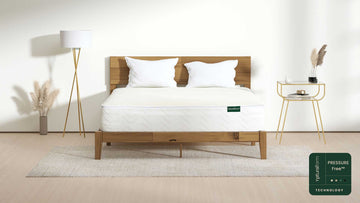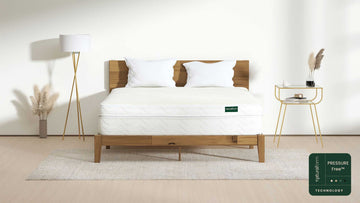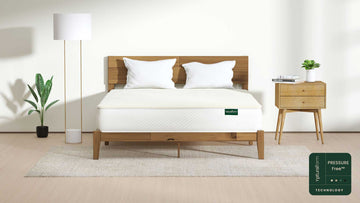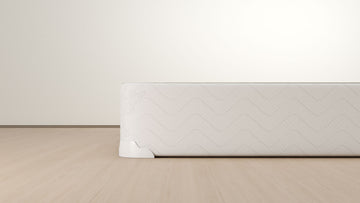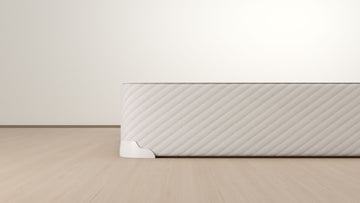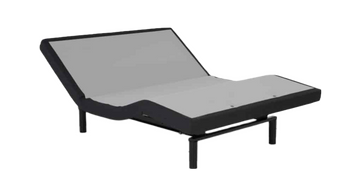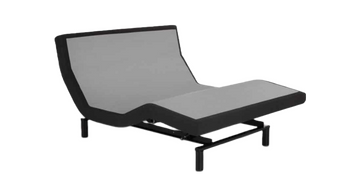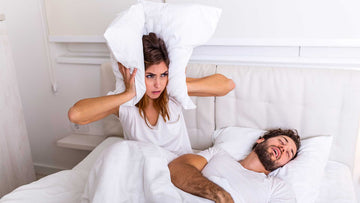Snoring is a common condition that affects millions of people all over the world. Some people are occasional snorers, while others snore every night. It’s thought that snoring can get worse as you age, and certain people are more likely to sore than others.
If you snore every night, then you tend to ruin your sleep quality and disrupt other people’s sleep patterns. It’s a pretty serious condition as your body needs a good night’s sleep to rest and recover. A lot of the time, you can prevent habitual snoring by doing something as simple as changing your mattress.
Complete guide on choosing the right mattress for snoring
Your mattress will ultimately determine the position that you sleep in. As a result, it can both cause and prevent snoring. If your old mattress doesn’t provide you with ample support, then it can put you in a sleeping posture that’s prone to snoring. But, if you switch to a mattress that’s designed to alleviate snoring, then you will improve your sleep quality and stop keeping your partner up at night!
Ideally, you should search for mattresses that target your posture and give support to the head and neck. If you don’t have this support, then your head and tech tend to fall out of alignment, which throws your spine out of position as well. As a consequence, the airway narrows, which means your throat can obstruct it a lot easier. Therefore, you end up snoring – and you get a lot of neck and back pain as well!
The best mattress for snoring should also be appropriately firm. If it’s too soft, then it just makes you want to lie on your side/back to try and get comfortable. When you do this, you end up in the prime positions to cause snoring and make it worse! So, there needs to be a degree of firmness that’s not too soft, but not too hard either. It needs to offer full support for your entire spine and head, no matter what position you’re in. You should be able to lie on your back, side, or stomach and not have any snoring problems.
What type of mattress is best at preventing snoring?
Generally speaking, if you want a mattress for snoring, then there are a few main options. Memory foam, supportive latex and high-quality air mattresses like Natural Form or Sleep Number tend to be the most effective.
To be more specific, the best mattresses for snoring are ones that can keep your back and neck in their proper position. Again, this prevents the issue of your spinal alignment falling out of place, leading to airway obstruction.
What’s more, it helps if the mattress that can stay cool as well. These provide you with the ultimate comfort as you sleep, which stops you from fidgeting and ending up in compromised sleeping positions to exacerbate snoring.
Having said that, the absolute best option – and also the most expensive – is an adjustable bed. Here, you can customize the perfect angle to get your upper body in the best position possible to alleviate snoring.
What causes snoring?
Some feel relaxed by a warm bath or shower before bed. Not working for you? Immersing your face in ice cold water for up to 30 seconds triggers your Mammalian Dive Reflex, an involuntary reflex that lowers your heart rate and blood pressure. Not up for that task? Just splashing your face and running your hands under cool water for 30 seconds can ease racing thoughts and stimulate instantaneous calm.
Snoring risks
Sleep apnea
Snoring is one of the telltale signs of sleep apnea. This is a chronic condition that occurs when your airway is blocked, and your breathing becomes very stop-start during your sleep.
Signs of sleep apnea include:
- Blockage in the airway causing significant interruptions of breathing (over 10 seconds) during your sleep.
- Waking up frequently during the night.
- Very light sleeping. When you have this problem, your body works overtime to keep your throat muscles active, so they don’t collapse and block the airflow. This makes you a very light sleeper as your body isn’t fully relaxed.
- High blood pressure and an enlargement of the heart – also an increased risk of heart attack/stroke.
- Consistently terrible night’s sleep.
- Deficient oxygen levels in the blood, which can often lead to hypertension.
- Frequent headaches every day.
- Obesity.
- Fatigue during the day.
Stroke
Heart disease
GERD
Headaches
Best sleeping positions to prevent snoring
Back
Side
Stomach
Tips to reduce snoring
Final thoughts
Sleep is essential if you want to maintain good health. As such, we need to ensure that the best quality sleep occurs each and every night. When you snore, it can reduce the quality of your sleep quite dramatically. However, you can combat this condition!
If you struggle with snoring, then you should try sleeping on your side or propping your head up with a pillow or wedge. You could also try using a humidifier, losing weight and adopting a healthier lifestyle. It’s highly recommended that you give your head and neck more support while you sleep, and you can always see a sleep specialist if the problem is very severe.
Having said that, one of the best solutions to a snore-free night could lie in a mattress for snoring. Get something that supports your body, and you’ll drift off into a comfortable and uninterrupted sleep.
Faqs
Are certain people prone to snoring
Absolutely, some things will cause snoring, and there’s very little we can do about it, such as:
- Being over 50
- Being male
- Having a recessed jaw/pronounced overbite
- Having small nostrils
- Being pregnant
Does snoring loudly mean you have sleep apnea?
Not always. The best way to determine this is when your loud snoring is broken up by choking or snorting sounds, which is caused by a breathing stoppage. Loud snoring is heavily associated with sleep apnea, and it can often be a stepping stone to it. But, not everyone who snores loudly will have this condition as well.
Will getting more sleep help prevent sleep apnea?
If you’re not getting approximately 8 hours of sleep every night, then you’re never going to be fully rested. As a result, you’re more likely to snore when you go to sleep. So, yes, getting more sleep in this scenario can prevent snoring.
Could buying a new mattress help stop snoring?
Yes, particularly if you’re sleeping on an uncomfortable mattress. Bad mattresses lead to lousy sleeping posture, which lead to snoring. The best mattresses for snoring will be medium-firm and offer total support for your spine, head and neck. Air mattresses are often considered the best choice, and you could get better results by investing in an adjustable bed as well.
It’s recommended that you check your mattress to see if it’s old and sagging in the middle. You should replace an old mattress as it won’t do anything good for you, and you’ll never have a good night’s sleep!
If you’re still unsure your mattress is the problem, check out our article below for more tips.
